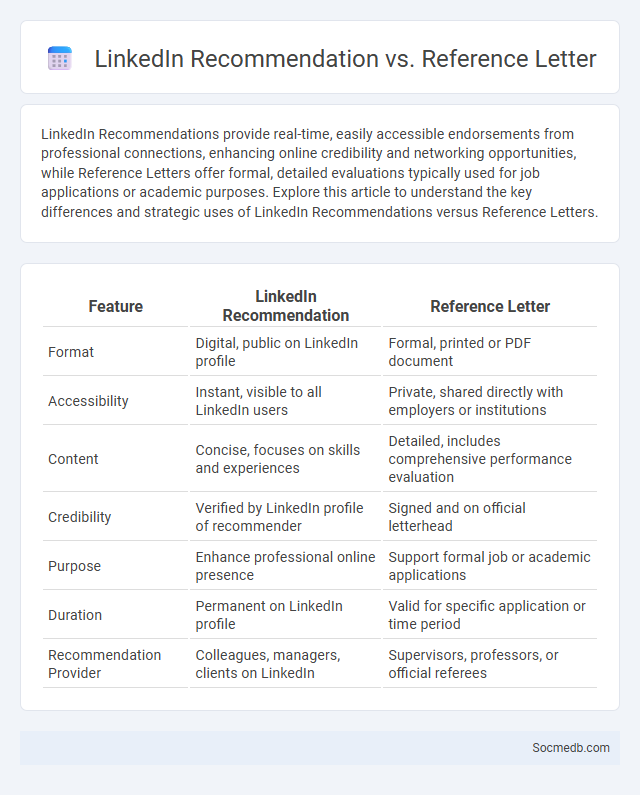
Photo illustration: LinkedIn Recommendation vs Reference Letter
LinkedIn Recommendations provide real-time, easily accessible endorsements from professional connections, enhancing online credibility and networking opportunities, while Reference Letters offer formal, detailed evaluations typically used for job applications or academic purposes. Explore this article to understand the key differences and strategic uses of LinkedIn Recommendations versus Reference Letters.
Table of Comparison
| Feature | LinkedIn Recommendation | Reference Letter |
|---|---|---|
| Format | Digital, public on LinkedIn profile | Formal, printed or PDF document |
| Accessibility | Instant, visible to all LinkedIn users | Private, shared directly with employers or institutions |
| Content | Concise, focuses on skills and experiences | Detailed, includes comprehensive performance evaluation |
| Credibility | Verified by LinkedIn profile of recommender | Signed and on official letterhead |
| Purpose | Enhance professional online presence | Support formal job or academic applications |
| Duration | Permanent on LinkedIn profile | Valid for specific application or time period |
| Recommendation Provider | Colleagues, managers, clients on LinkedIn | Supervisors, professors, or official referees |
Introduction to Professional Endorsements
Professional endorsements on social media enhance Your credibility by showcasing authentic recommendations from industry peers and clients. These endorsements leverage platforms like LinkedIn to amplify Your skill set, creating trust and increasing visibility in your professional network. Effective use of social media endorsements can significantly boost career opportunities and personal branding.
Defining LinkedIn Recommendations
LinkedIn Recommendations are personalized endorsements written by colleagues, clients, or employers that highlight your professional skills and achievements. These recommendations enhance your LinkedIn profile by providing credible social proof, increasing trust among potential employers or collaborators. You can leverage these powerful testimonials to showcase your expertise and build a strong professional network.
What Is a Reference Letter?
A reference letter is a formal document written by a social media manager or colleague that highlights an individual's skills, experience, and character within the digital marketing and social media industry. It provides credible support for job applications or professional opportunities by showcasing verified accomplishments like successful campaign management, audience engagement metrics, and content creation expertise. Employers often utilize reference letters to assess a candidate's reliability, professionalism, and suitability for a role in social media or digital communication.
Understanding Social Proof in the Workplace
Understanding social proof in the workplace enables you to recognize how colleagues' behaviors and opinions influence decision-making and team dynamics. Leveraging positive social proof can enhance employee motivation, foster collaboration, and build trust among your professional network. Your ability to identify authentic examples of peer endorsement strengthens organizational culture and drives collective success.
Key Differences Between LinkedIn Recommendations and Reference Letters
LinkedIn recommendations offer a dynamic, easily accessible way to showcase professional endorsements directly on your profile, integrating with your online presence and network. Reference letters are formal, static documents typically required for job applications or academic purposes, providing detailed, personalized validation from specific individuals. You can leverage LinkedIn recommendations to enhance your digital reputation while relying on reference letters for more traditional, official validation.
The Role of Social Proof in Personal Branding
Social proof significantly enhances your personal branding by demonstrating credibility and trustworthiness through testimonials, endorsements, and social engagement on platforms like LinkedIn and Instagram. High follower counts, positive comments, and shares serve as powerful indicators of influence, increasing your visibility and attracting opportunities. Leveraging social proof effectively helps you establish authority and connect authentically with your target audience.
When to Use LinkedIn Recommendations vs. Reference Letters
LinkedIn recommendations are ideal for showcasing real-time professional endorsements and client or colleague testimonials visible to a broad network, enhancing your online credibility. Reference letters carry more formal weight, typically required for job applications or academic purposes, providing detailed, personalized insights from supervisors or mentors. You should leverage LinkedIn recommendations for dynamic, ongoing professional engagement, while relying on reference letters for formal opportunities demanding verified character and experience validation.
Impact of Digital vs Traditional Endorsements
Digital endorsements on social media platforms yield higher engagement rates and broader audience reach compared to traditional endorsements, influencing consumer behavior more effectively. Social media allows targeted interactions and real-time feedback, enhancing brand trust and personalization for Your marketing campaigns. Brands leveraging digital endorsements can achieve measurable ROI with detailed analytics unmatched by conventional advertising methods.
Best Practices for Leveraging Social Proof on LinkedIn
Leveraging social proof on LinkedIn involves showcasing authentic testimonials, endorsements, and recommendations from colleagues and clients to build credibility and trust. You should actively engage with your network by sharing case studies and user-generated content that highlights successful collaborations or results. Optimizing your profile with strategic keywords and regularly updating achievements ensures your social proof enhances your professional reputation effectively.
Choosing the Right Endorsement for Career Success
Selecting the ideal social media endorsement can significantly impact your career trajectory by enhancing credibility and broadening professional networks. Analyzing platform demographics and aligning with influencers whose values resonate with your career goals ensures authentic engagement and targeted audience reach. Your choice in endorsements should strategically showcase your expertise to maximize visibility and unlock new career opportunities within your industry.
 socmedb.com
socmedb.com